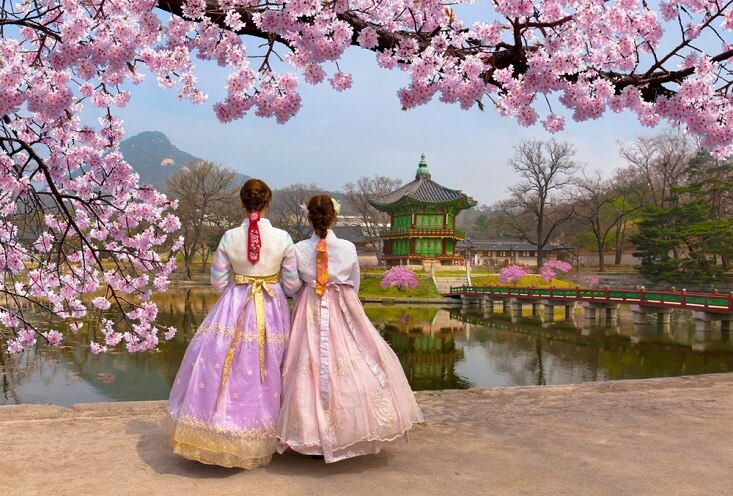South Korea is a great destination for TEFL teachers and if you’re thinking of teaching there you’ve probably already realised the first decision you’ll need to make: public school or hagwon?
Um, what is a hagwon?
Hagwons are private schools that many South Korean students attend outside regular school hours to get in some extra study. This is where they get the nickname ‘crammer schools.’
Academic success is a big deal in South Korea and while not all students do this kind of extra study, the hagwon industry is huge. There are around 100, 000 of them throughout South Korea, mostly in urban centers like Seoul and Busan.
Does it make much difference if I teach in a hagwon or a public school?
There are quite a few similarities between teaching in hagwons and public schools. You can expect a similar salary of around 2.1-2.5 million won per month ($1900 – 2236), with benefits like furnished accommodation, health insurance and return airfare included in your contract. You can also be sure you’ll teach kids and teenagers at public schools and hagwons, although hagwons may also run business English classes for adults.
Beyond this, there are actually more differences than you might think between teaching in a public school and a hagwon.
We’ll go into these in more detail below, but one of the most important things to bear in mind is that while public schools are funded and government-regulated, hagwons are unregulated, privately owned businesses. This means you could have a completely different experience working in one hagwon than you might in another. (Look below for tips on how to choose the right hagwon for you!)
The general consensus is that while teaching in a public school might provide regular hours and stability, hagwons could offer more flexibility and independence.
But let’s take a look at the finer details.
Hagwons vs public schools: You decide!

When do you want to move to South Korea?
The application process might make this decision for you. South Korean public schools have two start dates for English teachers each year: spring term and fall term. The application process takes a minimum of three months, and is normally done through programs like EPIK, GEPIK and SMOE. So if you decide in February that you want to teach in a South Korean public school, you’ll have to wait until the fall term of the same year to start. That’s a 7 month wait!
On the other hand, hagwons are not tied to the academic calendar and hire teachers all year round. The application process is also much quicker (generally only 2-3 months) so if you want to move to South Korea ASAP, this could be the option for you.
There is less competition for teaching positions in hagwons but all applicants will be expected to be a native English speaker, hold a degree and possibly a TEFL certificate.
Where in South Korea do you want to teach?
Do you think you’d be more at home in a busy urban centre, a small town or surrounded by nature in the countryside?
If all three options sound pretty great, then you’d be an ideal candidate for the public school system. When you apply to teach in a South Korean public school you don’t get to choose your exact location, as teachers have to be placed in schools throughout the country.
Hagwons are all over South Korea, so if you’ve got your heart set on teaching in a particular location applying to hagwons in the area might be your best bet. This is particularly true for big, popular cities where competition for teaching positions in public schools is most fierce but there are plenty of hagwon jobs around.
What kind of teaching do you want to do?
You know wherever you teach you’ll be working with kids and teens, but the kind of teaching you end up doing might differ depending on the kind of school you work in.
For starters, class sizes in public schools are about 30 – 40 students whereas in hagwons classes only have about eight students. Also, in a public school you’ll teach with a Korean co-teacher during your lessons and in a hagwon you’ll work alone.
The pros and cons of these set-ups really depend on the kind of teaching you want to do.
Some TEFL teachers find it more rewarding to teach independently and form stronger bonds with their small classes of students, as you can in a hagwon.
Others find the pressure placed on hagwon students to succeed is transferred on to them, making the job more stressful than it might be in a public school.
Are you looking for a South Korean immersion or an expat lifestyle?
Normally, teaching in a public school means you’ll be the only foreigner among all the other staff and students. If you are looking to learn Korean or immerse yourself in South Korean culture, this is a great way to do it!
But if you’d prefer your workplace to have a more international atmosphere, teaching in a hagwon will mean you have other expat colleagues to share your experience with.
When deciding on the kind of lifestyle you want, it’s also worth thinking about where you hope to live in South Korea. Big cities are more likely to have big expat communities.
Do you prefer working during the day or at night? And what about vacations?!
In public schools, working hours are a pretty regular Monday to Friday, morning and afternoon deal. You might have to work 8-hour days (rather than 6 or 7 at a hagwon) but you’ll normally only have to teach around 22 hours per week.
Hagwon teaching days might be shorter, but they could also be more intense, with up to 30 teaching hours, and possible overtime on weekends. Hagwon working hours also start as the public school hours wind down, so working evenings and weekends is to be expected.
When it comes to vacation time, public schools have the edge – on top of the 14 Korean national holidays most public school contracts normally include 20 – 25 days paid vacation per year, compared to two weeks paid vacation in a hagwon.

Sign up to Teach Away today for access to the latest
teaching jobs around the world.
I think hagwon teaching is for me! But how do I choose which hagwon to work for?
Good question! A word of warning before you start your Google search: there are plenty of hagwon horror stories out there. A quick peek at Hagwon Blacklist shows, at worst, hagwon bosses demanding overtime, withholding pay and terminating contracts at the last minute to avoid paying their teachers’ return airfares.
None of this is something you want to deal with in an unfamiliar country where you don’t speak the language!
Thankfully, there are also good hagwons out there and many teachers have great experiences working in them.
The best way to tell if a hagwon is good or not is to do plenty of research before you take a job anywhere. Here are some things to look out for…
Which are the best hagwons?
- Firstly, do you know anyone who has worked in South Korea? Can they recommend any hagwons to work in or do they know someone else who can?
- If not, search for reviews online. Waygook is a good forum for teachers in South Korea. As a rule, look for schools that have lots of reviews and avoid schools that don’t have any.
- Work with a few different recruiters. Each recruiter will have relationships with a different set of schools giving you a broader idea of what’s out there.
- Think about working for a hagwon chain. They are more likely to have some kind of standardised contract, and plenty of teacher reviews online so you can get a good idea of their work terms.
- Ask to speak to current teachers at any hagwon you are interested in working in. No one is in a better position to give you the real story about what it’s like to work there! Try to speak to more than one teacher, if possible.
- Finally, interview with as many different schools as you can, take notes and compare them.
What should I ask in a hagwon interview?

Interviews are a great chance to get a feel for your potential employers. How approachable they are and how clearly they answer your questions will give you an indication of what they might be like to work for. Here are some things you should definitely ask in an interview before accepting a hagwon job:
What is a teaching hour?
Some hagwons define a teaching hour as 45-50 minutes with a few minutes turn-around between lessons, and others count an hour as a full 60 minutes.
What do teachers do apart from teach?
Other responsibilities might include writing reports, doing marking or monitoring students. Make sure you find out how often you’ll be expected to do these things and be paid for them.
Do teachers work overtime?
Find out if you’ll be expected to work weekends and if so, how many.
What does the teachers’ accommodation look like?
Ask to see photos of the accommodation they are offering and find out exactly what furniture is included.
What is the commute to work like?
Find out how long you’ll spend travelling to work from your accommodation and make sure there is a reliable public transport route.
How does vacation time work?
Make sure you know in advance whether the school specifies when you take your vacations or if you get to choose.
These are just some questions to cover in an interview, but ask as many as you can think of. Any good hagwon should be able to answer all of these questions and more! Take notes, make sure you get clear answers and you can even ask for confirmation of the terms agreed to in your interview in writing.
Finally, don’t be afraid to be a bit picky. There are thousands of hagwons in South Korea, and there’s sure to be one that’s great for you!




